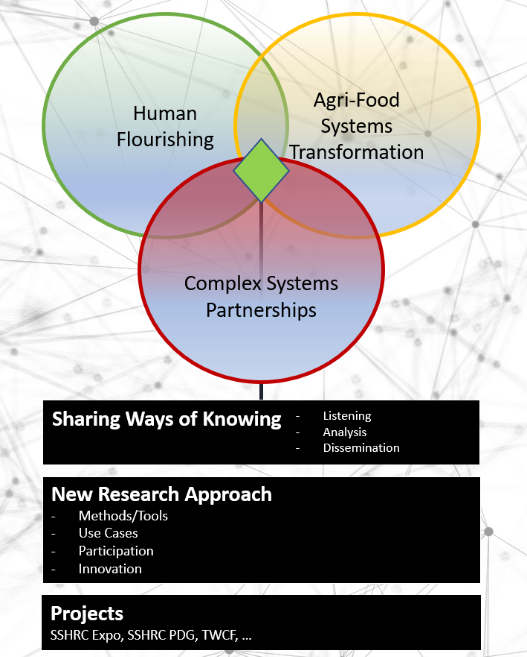2021-ongoing Human Flourishing
Responding to dynamic environmental challenges to food security is opening the way for innovation and new economic opportunities in Canada’s North as well as the Global South. There are, however, limited shared perspectives among cultural and economic champions on the best, most inclusive ways forward, and how these can be facilitated to draw the most benefit for the wellbeing of these communities and their resilience.
There is a desire from the communities themselves to understand how local food systems, particularly in a warming climate, can contribute to food security and food sovereignty. The interplay of food sovereignty, community resilience, as well as wildlife and natural resource management are also very relevant to this understanding as much among Canada’s northern communities as for communities facing these challenges and opportunities in the Global South. Efforts to build an enabling food policy environment that strengthens the resilience of communities need to be tailored to the specific contexts of those communities (Herforth and Ahmed 2015; Turner et al. 2017; Downs et al. 2020). This includes harnessing their existing assets, addressing their specific constraints, and reinforcing cultural and economic ties between communities. It also benefits from an acknowledgment that there is a richness in diverse Ways of Knowing that can be shared across political and cultural boundaries to enhance how these challenges and opportunities are viewed and addressed.
The AFT4EHF global program is led by the University of Saskatchewan along with a multidisciplinary group of academic researchers, community, government, and private industry partners in Canada and in the global south. Our team is multi-disciplinary and brings extensive experience to this project in the areas of community-engaged and participatory research, adolescence, maternal and child health, education, gender, social work, international development, faith, and social justice.
At its core is a series of youth-focused action research projects that seek to build a shared understanding of agri-food system innovations, food security and food sovereignty in Canada’s North and the Global South through a human flourishing lens. The Program applies a Strengths-based Systems Approach to contribute to the achievement of the United Nations Sustainable Development Goals (SDGs) whereby a growing portfolio of projects is conceived and designed at the nexus of three complementary thematic areas of research, action and policy formulation namely, Agri-food Systems Transformation, Human Flourishing and Complex Multi-Stakeholder Partnership Facilitation.

Project development is based on an iterative and participatory process that focuses on acknowledging and sharing ways of knowing through respectful dialogue, participatory analysis and disseminating lessons learned and recommendations for action. The Program also serves to pilot and refine innovative quantitative and qualitative research methods and tools.
In the Northern communities, the overall purpose of The Program is to mobilize youth in advancing connection, understanding and taking collective action to address food security and food sovereignty through agri-food solutions in the face of climate change. This encompasses the following objectives:
- To create partnerships withvarious stakeholder groups (indigenous and non-indigenous communities) including entrepreneurs (processors, farmers, distributors, etc.) and youth;
- To build shared understanding of Northern youth’s and communities’ perspectives on their food choices, food environment, and agri-food systems, including constraints and opportunities to improve food security and food sovereignty, and to increase youth interest and involvement in the change process for addressing food insecurity,
- To develop a conceptual framework that focuses on human flourishing that can guide our understanding of how physical, mental, spiritual and social dimensions of human flourishing intersect to build resilience and strengthen food security and food sovereignty,
- To jointly develop and pilot innovations that link human flourishing, food security and food sovereignty for enhanced wellbeing and livelihoods among northern communities, and
- To link these experiences and ways of knowing of communities in Northern Canada with the global development scholarship and discourse.
Team Members
- Leon Andrew, SRRB
- Carol Henry, University ofSaskatchewan
- Judy White, University of Regina
- Sarah Crawford, University ofSaskatchewan
- Alyssa Bougie, SRRB
Funders
University of Saskatchewan (and potentially SSHRC)
Budget
$10,000 (seeking additional funding)



 Phone: 867-374-4040
Phone: 867-374-4040 Email:
Email: